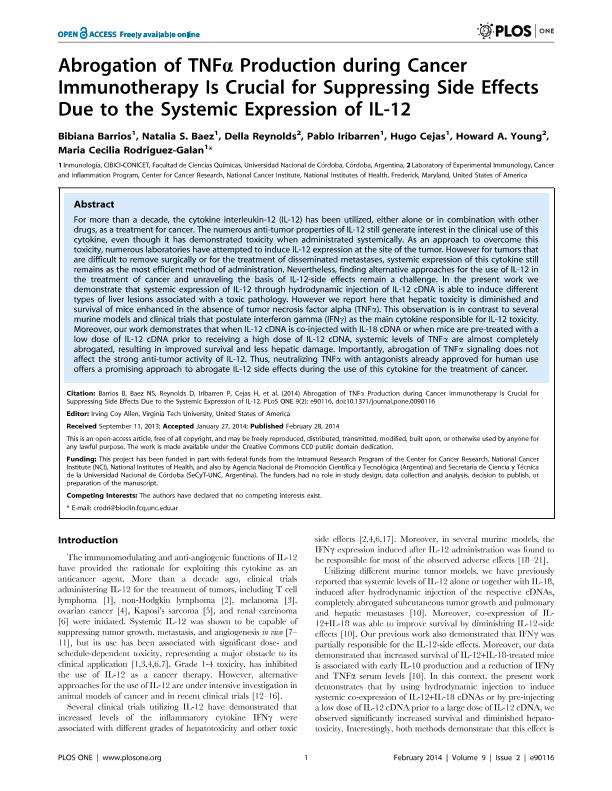Artículo
Abrogation of TNFα Production during Cancer Immunotherapy Is Crucial for Suppressing Side Effects Due to the Systemic Expression of IL-12
Barrios, Bibiana Elisabet ; Baez, Natalia Soledad
; Baez, Natalia Soledad ; Reynolds, Della; Iribarren, Pablo
; Reynolds, Della; Iribarren, Pablo ; Cejas, Hugo; Young, Howard A.; Rodriguez Galan, Maria Cecilia
; Cejas, Hugo; Young, Howard A.; Rodriguez Galan, Maria Cecilia
 ; Baez, Natalia Soledad
; Baez, Natalia Soledad ; Reynolds, Della; Iribarren, Pablo
; Reynolds, Della; Iribarren, Pablo ; Cejas, Hugo; Young, Howard A.; Rodriguez Galan, Maria Cecilia
; Cejas, Hugo; Young, Howard A.; Rodriguez Galan, Maria Cecilia
Fecha de publicación:
02/2014
Editorial:
Public Library of Science
Revista:
Plos One
ISSN:
1932-6203
Idioma:
Inglés
Tipo de recurso:
Artículo publicado
Clasificación temática:
Resumen
For more than a decade, the cytokine interleukin-12 (IL-12) has been utilized, either alone or in combination with otherdrugs, as a treatment for cancer. The numerous anti-tumor properties of IL-12 still generate interest in the clinical use of thiscytokine, even though it has demonstrated toxicity when administrated systemically. As an approach to overcome thistoxicity, numerous laboratories have attempted to induce IL-12 expression at the site of the tumor. However for tumors thatare difficult to remove surgically or for the treatment of disseminated metastases, systemic expression of this cytokine stillremains as the most efficient method of administration. Nevertheless, finding alternative approaches for the use of IL-12 inthe treatment of cancer and unraveling the basis of IL-12-side effects remain a challenge. In the present work wedemonstrate that systemic expression of IL-12 through hydrodynamic injection of IL-12 cDNA is able to induce differenttypes of liver lesions associated with a toxic pathology. However we report here that hepatic toxicity is diminished andsurvival of mice enhanced in the absence of tumor necrosis factor alpha (TNFa). This observation is in contrast to severalmurine models and clinical trials that postulate interferon gamma (IFNc) as the main cytokine responsible for IL-12 toxicity.Moreover, our work demonstrates that when IL-12 cDNA is co-injected with IL-18 cDNA or when mice are pre-treated with alow dose of IL-12 cDNA prior to receiving a high dose of IL-12 cDNA, systemic levels of TNFaare almost completelyabrogated, resulting in improved survival and less hepatic damage. Importantly, abrogation of TNFasignaling does notaffect the strong anti-tumor activity of IL-12. Thus, neutralizing TNFawith antagonists already approved for human useoffers a promising approach to abrogate IL-12 side effects during the use of this cytokine for the treatment of cancer.
Palabras clave:
Il-12
,
Il-18
,
Tnf-A
,
Gene Therapy
,
Cancer
Archivos asociados
Licencia
Identificadores
Colecciones
Articulos(CIBICI)
Articulos de CENTRO DE INV.EN BIOQUI.CLINICA E INMUNOLOGIA
Articulos de CENTRO DE INV.EN BIOQUI.CLINICA E INMUNOLOGIA
Citación
Rodriguez Galan, Maria Cecilia; Young, Howard A.; Cejas, Hugo; Iribarren, Pablo; Reynolds, Della; Baez, Natalia Soledad; et al.; Abrogation of TNFα Production during Cancer Immunotherapy Is Crucial for Suppressing Side Effects Due to the Systemic Expression of IL-12; Public Library of Science; Plos One; 9; 2; 2-2014; 1-11
Compartir
Altmétricas



